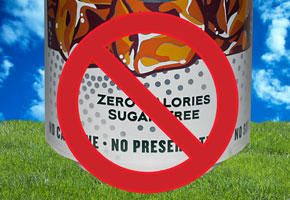
Artificial Sweeteners? They mess with your friendly bacteria!
By Dr. Daria | 0 Comments | Posted 10/04/2014
When it comes to artificial sweeteners, the only good news is “No Calories”. When you are watching your diet and counting calories, something that adds sweetness without adding calories seems like a good plan!! Then again ….maybe not!
Artificial sweeteners (like saccharin, sucralose and aspartame) are not all that healthy – for a variety of reasons. One of the problems with artificial sweeteners is the development of “glucose intolerance” which is a precursor to the development of Type 2 Diabetes. Type 2 Diabetes is at epidemic proportions in the U.S. So, watching what and how we eat is in our best interest …. for diabetes prevention and a whole lot of other health issues.
As it turns out, artificial sweeteners are not so sweet for our friendly bacteria, the probiotics that are part of our GI tracts. I’ve talked a lot about probiotics, prebiotics and pharmabiotics. Probiotics are critical for your health. Seriously …. critical for your health! Prebiotics are a major food source for your probiotics. Pharmabiotics are made by your probiotics (and they have direct health benefits).
A study was recently published in the Journal – Nature on artificial sweeteners altering friendly bacteria. Three main findings were:
● The researchers found that mice who were given drinking water that contained saccharin or sucralose or aspartame suffered a disruption in the friendly bacteria and that disruption lead to elevated blood sugar levels (glucose intolerance).
● The researchers then looked at 381 non-diabetic people. Those who regularly consumed artificial sweeteners showed higher fasting glucose levels (not a good thing), poorer glucose tolerance, and differences in friendly bacteria populations compared to those who did not consume artificial sweeteners.
● The team exposed seven young healthy subjects who did not use artificial sweeteners to 7 days of saccharin intake. Four of the seven showed varying degrees of glucose intolerance. Those four had changes in their friendly bacteria. Those who showed no changes in glucose metabolism also had no change in friendly bacteria.
So, the bottom line of the study … artificial sweeteners mess with your friendly bacteria and that messes with your health!
There are many different health issues with artificial sweeteners. Knowing that some of the problems start right with our friendly bacteria is amazing, and kind of sad. If you are a person who regularly uses artificial sweeteners, pay attention to your intake of probiotic foods. Even consider a probiotic supplement a few times a week to increase your population of friendly bacteria. Better yet, be nice to your friendly bacteria and avoid the artificial sweeteners all together!!
We’ll bring you more information about the health hazards of artificial sweeteners in some future posts. If you already avoid them, great! If not, maybe now is a good time to start decreasing your use. And, once again, let’s protect our friendly bacteria!
Additional Resources:
More on Probiotics


 Contact us
Contact us



























